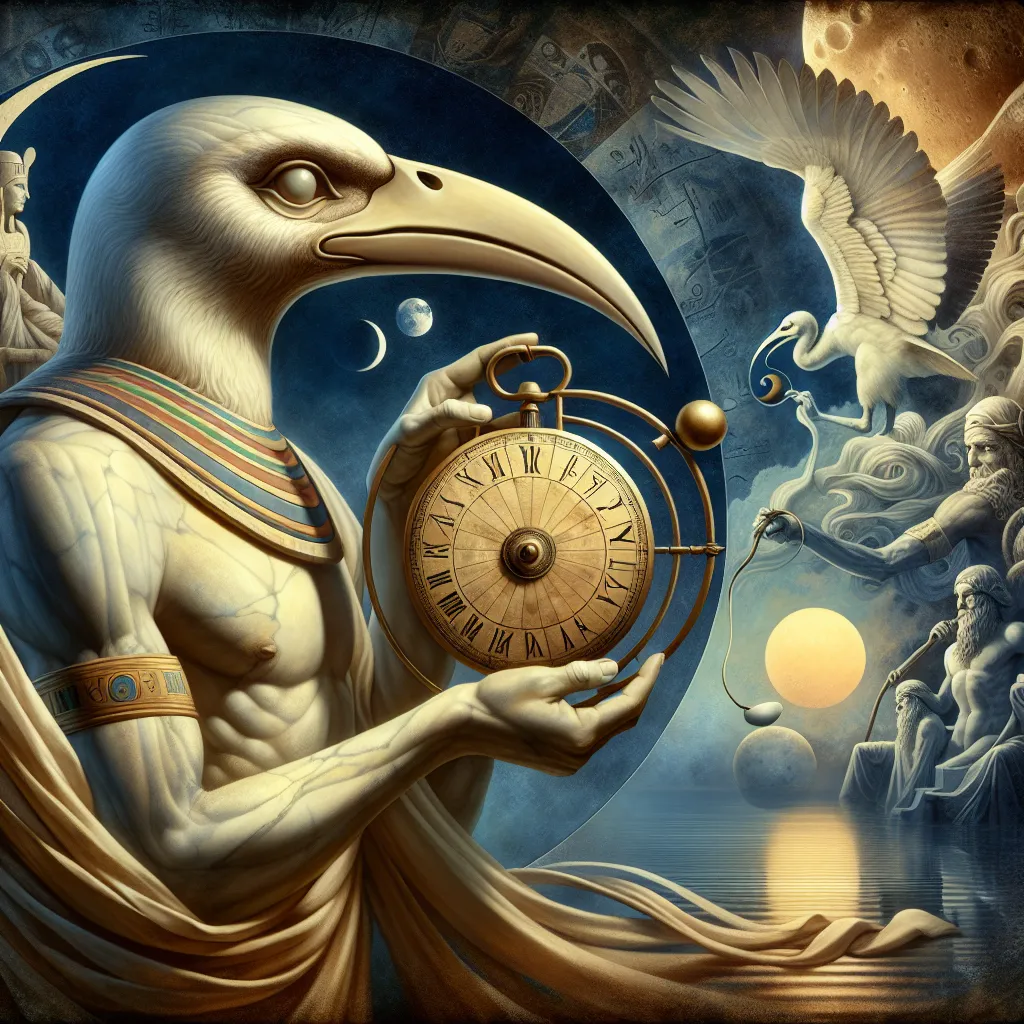
- Published on
- Authors

- Name
- You
Introduction
Thoth, known to the ancient Egyptians as Djehuty, is one of the most enigmatic deities in ancient Egyptian mythology. Revered as the god of wisdom, writing, mathematics, and magic, Thoths domain also extends to the moon, making him a critical figure in both spiritual and scientific aspects of Egyptian life. This article delves into Thoths connection with the moon, his role as a lunar deity, and his significance as a timekeeper in the ancient Egyptian calendar.
Thoth and the Moon
Lunar Deity Attributes
Thoth was often depicted with the head of an Ibis, a bird associated with wisdom and the moon. His imagery sometimes included a crescent moon on his headdress, symbolizing his lunar attributes. As a lunar deity, Thoth was believed to control the cycles of the moon, which were essential for both the spiritual and practical lives of the ancient Egyptians.
The Ibis and Lunar Symbolism
The Ibis, Thoths sacred bird, had a long, curved beak resembling the crescent moon, symbolizing the union of heaven and earth. The bird's nocturnal habits linked it further to lunar cycles, and Thoths presence during both day and night emphasized the balance between light and darkness, knowledge and ignorance.
Thoth as the Divine Timekeeper
Lunar Calendar
The ancient Egyptians relied on a lunar calendar for both religious festivals and agricultural activities. Thoth, as the god associated with the moon, played an integral role in timekeeping. His accurate knowledge of the celestial bodies allowed the Egyptians to create a calendar that synchronized lunar and solar cycles, essential for predicting the annual inundation of the Nile.
The Hermopolitan Ogdoad
In Hermopolis, Thoth was part of the Ogdoad, a group of eight deities representing primordial elements. Thoth and his female counterpart Ma'at (representing order and balance) were responsible for the creation of time and the regulation of cosmic order. This connection further reinforces the essential role Thoth played in the maintenance of time and celestial harmony.
Advanced Science and Mystical Wisdom
Astronomy and Mathematics
Thoths wisdom was not limited to the spiritual realm; it also encompassed astronomy and mathematics. The ability to track and predict lunar phases required a deep understanding of the night sky—a knowledge Thoth imparted to the ancient Egyptians. This blend of mystical wisdom and scientific knowledge reflects the holistic view of the universe held by the ancients.
Rituals and Ceremonies
In ancient Egyptian practice, rituals associated with Thoth often took place during specific lunar phases. These ceremonies, aimed at ensuring cosmic balance and favor from the gods, included:
| Phase of the Moon | Ritual or Festival | Purpose |
|---|---|---|
| New Moon | New Moon Festival | Celebrating Thoths wisdom and seeking new beginnings |
| Full Moon | Rituals of Abundance and Fertility | Honoring the moon's fullness and asking for prosperity |
| Waxing Crescent | Rituals of Growth | Focusing on personal and communal advancement |
| Waning Crescent | Rituals of Reflection | Contemplation and preparation for the new moon cycle |
Conclusion
Thoths connection to the moon and his role as a timekeeper underscore his significance in ancient Egyptian culture. His influence permeated both the spiritual and scientific realms, exemplifying the intertwined nature of advanced knowledge and mystical wisdom. Revisiting the stories and practices surrounding Thoth provides a unique perspective on how the ancients viewed time, celestial phenomena, and the delicate balance of the cosmos.
Further Reading
For those interested in exploring more about Thoth and his celestial roles, consider the following resources:
- The Ancient Egyptian Pyramid Texts by James P. Allen
- Thoth: The History of the Ancient Egyptian God of Wisdom by Charles River Editors
- Egyptian Myths and Mysteries by Rudolf Steiner
In the grand dance of the cosmos, Thoth stands as a timeless symbol of the union between knowledge and mystery, illuminating the night with his lunar wisdom.
